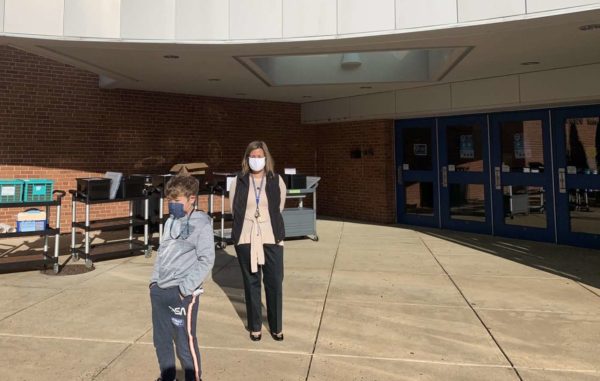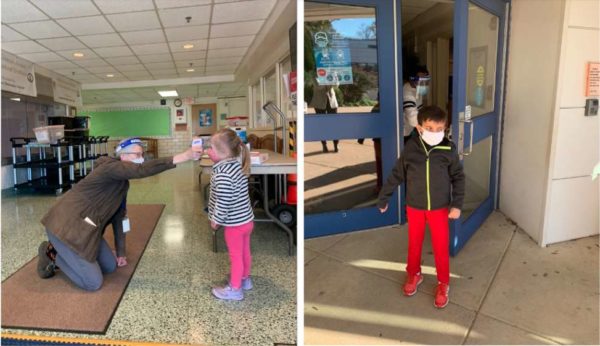(Updated at 4:40 p.m.) Even a limited return to classrooms has some Arlington Public Schools employees worried, amid questions about safety protocols and the benefit of the in-person activity.
Thirty-three schools opened their doors last week for students with disabilities, as part of “Level One” of the return-to-classrooms plan. Classroom assistants are helping the students to participate in distance learning activities, within school buildings, while teachers remain remote.
“The catch is that they’re still learning virtually,” said one assistant, who spoke with ARLnow among a group of other assistants, all on the condition of anonymity.
Some school staff members also say they walked into buildings with spotty adherence to the protocols.
Several assistants told ARLnow that they cannot be physically distant from students, who need one-on-one care. There are also reports that not all staff are staying home if they feel ill, and the system is not providing employees enough information on cases among staff, according to the Arlington Education Association, a labor group representing APS employees.
The assistants, who have been with the school system for a combined total of 22 years, decided to speak up because APS is not following through on its protocols, she said.
“We’re just trying to get the word out there because we don’t think it’s fair we’re back,” she said. “Numbers are rising. We’re here risking our lives to watch them learn virtually. We want to be back when it’s safe and to the fullest extent.”
In response, APS spokesman Frank Bellavia emphasized that the return-to-school plan is still in the early stages and said adherence is being examined.
“Students have been in school for a week and we are working through making sure our protocols are followed,” he said in an email.
The assistants’ assignments are based on student need, Bellavia said. While students need teachers to support distance learning, they need assistants for one-on-one support.
On Tuesday, AEA President Ingrid Gant said her organization does not have confidence in APS’s return-to-school plan.
“Dr. Durán, the lives of our students, staff, and teachers are at the forefront, while the number of cases in Arlington and surrounding districts continue to increase,” Gant wrote in a letter to Superintendent Francisco Durán. “The delaying of Level Two returns proves you are putting our school system first. However, any references to the APS Engage page at this time cannot give answers to our needs and pertinent concerns.”
The AEA wants the school system to test every room for adequate air transfers; communicate anonymous information related to cases, hospitalizations and deaths; ensure staff can stay distant while students eat; and provide staff with four N95 masks a week.
Bellavia responded that HVAC testing, communication to staff regarding COVID-19 cases, lunch periods and PPE are being done or have already been addressed in previous communications to staff.
“We are committed to the health and safety of staff and students and are following guidance from the Centers for Disease Control and Prevention and Virginia Department of Health,” he said.
Meanwhile, the group of assistants said they cannot keep their distance because kids need help using their iPads. Complicating the close contact is that many cannot wear masks, as a result of their disabilities. While students should have doctor’s notes supporting their exemption, many do not, they said.
Others cannot regulate bodily functions such as drooling, spitting and biting, and need assistance going to the bathroom.
“It’s not the students’ fault,” said the assistant. “We understand they have these difficulties.”
Physical distancing may not be able to occur at all times, due to the student’s disability, Bellavia confirmed.
“The Office of Special Education has provided guidance and appropriate methods of providing support that incorporates mitigation measures to continue to support students with disabilities,” he said.
Milagros Martinez, an executive committee member of AEA who represents extended day staff and educational support staff in APS, confirmed that the association is hearing from assistants who share the concerns of the group who spoke to ARLnow.
After talking to supervisors and assistants, Martinez found many schools were prepared but some were not. One week in, “things are starting to settle down,” she said.
Of those who spoke to her, a majority said they feel safe and have adequate PPE, Clorox wipes and hand sanitizer, but “this is not true for all the schools.”
Martinez said she supports the assistants who spoke up, adding that the biggest challenge is the unknown.
“I know that the schools are trying but things are not falling in place in some locations,” she said.
Another unknown relates to exposure to COVID-19: Staff want to know if people in their building test positive for the virus or are sent home ill, she said.
“We know there are cases, but we don’t know where, and we hear of them through word-of-mouth,” she said.
Staff also do not know if everyone is being honest on screening questions. Some are afraid to report possible symptoms, or do not understand their symptoms, and have worked full days before they reported having the virus days later, Martinez said. Some employees show up anyway because they need to provide for their families.
“You have to put on your warrior outfit so that you can come home and know that you have a home to come home to,” she said.
As of Nov. 6, 13.6% of APS staff have been kept from school buildings because they were symptomatic, in close contact with someone who was, had a positive test, or put on leave because a family member’s school or place of care is closed, Bellavia said.
“We are sensitive to protecting employees’ private health information and follow all Centers for Disease Control and Virginia Department of Health guidelines regarding close contacts, notifications and exclusions,” he said.
For the assistants, the risks do not outweigh the benefits of in-person virtual learning for students with disabilities, who struggle to use their iPads either at home or at school.
That is why one mother turned down Level One for her daughter with Down Syndrome.
“Our daughter is refusing to meaningfully participate,” the mother said, in comments read at this month’s School Board meeting. “She successfully attended four years of APS preschool and loved school.”
Her daughter no longer loves school and the mother said she was denied by private “learning pods” because of the child’s disability.
“I’m at a loss for what to do,” she said. “We thought Level One would provide instruction, not change the venue for watching the iPad.”
Images via APS/Twitter



